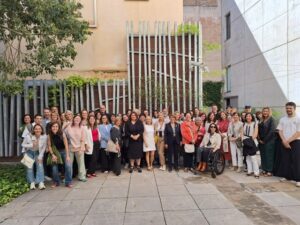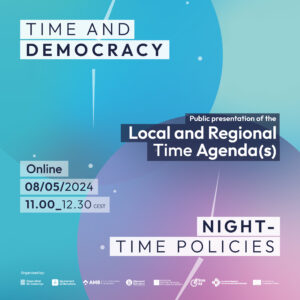The 1st Ibero-American Time Use Week (I Semana Iberoamericana de los Horarios y el Tiempo), celebrated between 19th and 22nd September 2022, has discussed the need to guarantee the right to time as a new civic right, taking into account its direct relation with aspects such as health, happiness, work, and care. By highlighting time poverty as an essential issue and how political action on the topic is needed, an analysis on how such conditions are particularly accentuated by reasons of class, age, and gender has been made.
Collaboration between public institutions is key for designing time policies in line with the current societal challenges, especially in the Latin American context. Intervention must be made through cross-sectoral actions, in forums and meeting points that encourage working networks that allow learning from municipalities and continents.
The following conclusions stand out:
Time organisation creates a better quality of life for all citizens. The vast majority of people want more leisure time, a new time balance that allows them to live better, and more autonomy for enjoying their leisure. In Latin America, women spend on average three times more time than men in domestic and care unpaid work. We need to find a more egalitarian time organisation — one that democratises leisure time, especially for women and people with lower resources. Only then will time poverty be reduced and individual and global well-being increased.
Time will be the battlefield for new generations. We have seen in the United States the ‘Great Resignation’, the mass dripping of workers who have left their jobs voluntarily since the post-pandemic recovery began. In other regions of the world, many working people, especially the youngest and most educated generation, say “enough” to the current time organisation. In addition, in Latin America, a concern about long working hours is beginning to spread.
The issue is not to working less, but a new work-life balance, as the International Labour Organisation Working Time Guide (2019) acknowledges in order to have ‘decent work’. A more balanced working time allows individual and business efficiency to be increased —and worker’s satisfaction too. A society that guarantees the right to time works better and allows more talent and innovation to be developed.
It improves physical and mental health. The current time culture and organisation does not allow for proper resting, which directly affects physical and mental health. Living without taking into consideration human circadian rhythms alters our mood, produces more obesity, more risk of cancer and cardiovascular diseases. In order to be healthier, a time organisation that meets such criteria is necessary, especially when defining school and working hours. Argentina is a country where this debate on time zones alligned with social rhythms is beginning to be put on the agenda, as the province of Mendoza demonstrates.
It responds to the climate and democratic crisis. A new organisation of time is directly linked to the commitment towards energy saving, proximity, sustainability, and digitalisation policies — all of them tackling unnecessary commuting and CO2 emissions, and strengthening the community. For a greater citizen participation and an increase in the democratic quality, it is necessary to enhance and democratise access to free time. If a society does not have free time, it is impossible for it to participate in the community and democratic life on a continued basis.
It forms the basis of new public policies. From the establishment of appropriate time zones to working and school hours, it is necessary to reflect on the regulation of 24-hour society through multi-level public policies. They promote population’s well-being through evidence-based actions towards right to time.
Due to all these reasons, organisers have already announced that it will be the first of many Latin American Time Use Weeks.








